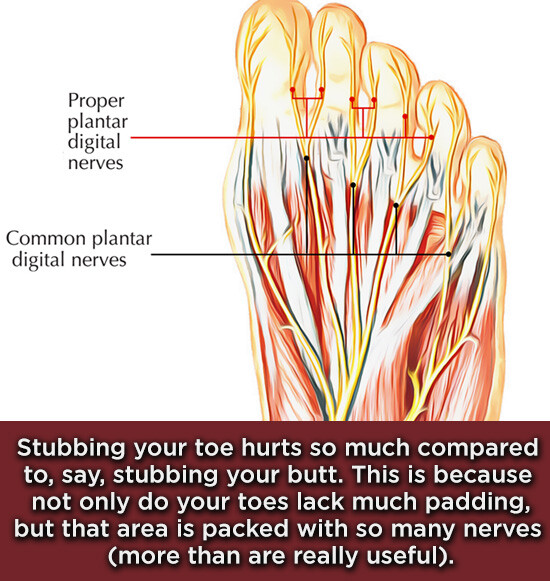55 Bizarre Facts About The Human Body

Scientists who study rocks think rocks are interesting, but they have nothing on scientists who study the human body. Because your body is amazing, a source of endless information on the stuff it can do, the stuff it can't do, and the terrifying stuff that happens when things go wrong.
1. Eye Resolution
Your eyes aren't nearly as precise as you think. You have enough eye receptors to see the equivalent of 2 megapixels at once, a lot less than a decent camera or even a 4k video. But you perceive more because your eye keeps moving, and your brain fills in the gaps.
Don't Miss
2. Baby Cells
The majority of mothers retain some cells of their children long after giving birth. This means most women with sons have some male cells in their body, including in their brain.
3. The Claustrum
Your brain has an on/off switch. Shock the claustrum, a little bundle of cells in the cerebrum, and the patient goes unconscious. Shock it again, and the patient wakes up.
4. Ondine's Curse
This frightening disorder leads you to just plain forget how to breathe. Sleeping becomes fatal unless you drill a spare hole in your throat.
5. Oxygen
It's possible to get oxygen into your system without breathing. Doctors can inject oxygen -- not by jabbing you with syringes of pure air, which would kill you, but by surrounding the oxygen with lipids. Useful in emergencies!
6. Face Spiders

7. Blue Eyes
Blue eyes are becoming rarer, both due to the increase in interracial marriage and (less obviously) interethnic marriage within the same races. Of course, you'd have heard this fact already if you keenly read white supremacist literature.
8. Eye Color
On the other hand, it's now possible to change your eyes to blue using a 40-second process. It seems all eyes are actually blue when you remove the extra pigment, and you can blast away that pigment using lasers.
9. Troposmia
This unfortunate disorder makes everything smell worse. Not just subjectively worse, but it replaces familiar smells with unpleasant alternative ones, like making you smell garbage every time a banana appears or turning flowers into rotting fish.
10. Neanderthals
Depending on your ancestry, you might share a bunch of DNA with Neanderthals. Europeans and Asians share about 1 to 4 percent of their DNA with Neanderthals, while sub-Saharan Africans do not.
11. Hair and Nails
Hair and nails don't keep growing after you die, despite what the popular myth says. Your skin will pull back a bit after death, which will give the appearance of these parts growing.
12. Taste Buds
You can easily mess with taste buds, changing how all food tastes. Toothpaste is the most obvious way: Dissolving your bitter taste buds' fatty coating primes them. Or eat an artichoke to deactivate your sweet receptors, or eat Synsepalum dulcificum to turn sour food sweet.
13. Light

14. Eye Damage
Sitting close to the TV does not damage your eyes, no matter what your parents told you. So, breathe easy as you now strap a VR headset 3 millimeters from your corneas.
15. Dim Light
Reading in dim light doesn't damage your eyes either -- though, this is a myth surely on its way out, with people a lot more concerned about reading from lit devices than using poor lighting to read books.
16. The Anterolateral Ligament
We're still discovering organs on a semi-regular basis. For the last 150 years or so, we knew of four ligaments in each knee and theorized that there might be more. Then we finally realized, yup, there's a fifth ligament in there.
17. Addiction
It's possible to instantly break your body's addiction to heroin or morphine with a one-time application of a different drug, which targets a specific receptor. As for whether there's any downside to this rewiring, well, doctors are researching that as we speak.
18. Belly Buttons
Your belly button contains thousands of different species of bacteria. Weirder, a swab of a typical person's belly button reveals a thousand or so species of bacteria that have previously never been identified.
19. Time Bombs
Our actions affect the DNA we pass on in ways we don't fully understand and that we once thought impossible. For example, it appears that if someone suffers from starvation, their grandchildren suffer reduced life spans, in ways not explained by poverty.
20. CRPS

21. Feet
Feet are getting bigger -- the average shoe in, say, Britain has gone up by two sizes in 40 years. This isn't evolution but the dramatic effects of improved nutrition.
22. Stem Cells
Adult teeth contain stem cells, which had previously only been known to exist in a usable form in fetuses. We're just starting to figure out the applications of this, but we've so far managed to treat cleft palates and dead nerves.
23. Teeth
Another application of dental stem cells: Regrowing your teeth. Which offers an alternative to another exciting possible method of growing teeth, which involves ultrasound waves.
24. Cataplexy
Sleep paralysis is unpleasant. But your body can also experience the same thing while awake. We're not talking about permanent paralysis here but the loss of all muscle control when you experience emotions -- such as during laughing fits, crying, or sex.
25. Energy Consumption
Humans grew 14% bigger and 1.3% taller over the last 40 years, which led global food energy needs to outpace population growth, growing by 129%.
26. Weird Smells
Smells are all about association rather than information. The same chemical, in a minute quantity, can smell floral in a perfume or can smell like shit ... because it's literally the ingredient that gives shit its scent.
27. Floaters

28. Assassin Poop
An insect called the assassin bug may land on you and suck your blood. Its poop enters your blood and carries a parasite, which affects your DNA enough to pass disease on to your children.
29. Bone Renewal
Your bones don't only heal after fractures. They are continuously remodeled, leading you to get a brand-new skeleton every ten years.
30. Gorham-Stout Disease
That bone renewal fails, though, if you have idiopathic massive osteolysis. With this disease, you'll lose the ability to grow new bone, so your bones will start disappearing.
31. Stomach Lining
Your stomach has to renew quite a bit faster than your skeleton. You get a new stomach lining every three days or so to make up for how fast acid eats through you.
32. Ear Noise
You're constantly blocking out noises without even realizing it. Try turning a voice recorder on as you go about your day. Background noises you never noticed will drown out conversation.
33. Microflora
Some scientists now consider the trillions of microbes that live in your gut to make up a distinct organ of your body. Not only do they outnumber your own cells, but they also have the ability to control your behavior.
34. Toes

35. Sunburn
The red in sunburn isn't the burn itself but your body's healing process, inflaming the area that's been damaged. As for the pain, that's also not a direct consequence of the burn. It has to do with your immune response, and there may be a way of turning it off.
36. Junk DNA
We like to think of our DNA as some kind of sacred code, but only 8.2% of it has any function at all. The rest of it is junk and does nothing.
37. Dormant DNA
Though, some stuff that seems like it does nothing can wake up and do just the worst possible stuff. Like one gene that's dormant because it's missing one sequence. One mutation, and boom, you've got muscular dystrophy.
38. Self-Amputation
If you suffer from dactylolysis spontanea, a ring of fibrous tissue appears around your pinky toe. It tightens, breaks through your bone, then snaps your toe right off. You better check your toe right now, just to be sure.
39. Infrasound
You may be hearing lots of sounds that you don't consciously perceive. It's called infrasound and is too low-frequency for you to hear, but it still affects your mood, leaving you everything from nauseous to euphoric.
40. Alcohol Rebound
Sleep is the best way to recover from drinking, and yet after heavy drinking, you often find yourself waking early. It's a documented phenomenon, and it has something to do with your organs working overtime for the first half of your sleep cycle, trying to detox.
41. Tongue Rolling

42. SCDS
If you come down with superior canal dehiscence syndrome, you will start to hear the internal parts of your body move. You will even be able to hear your eyeballs turn. It'll almost be a relief when total hearing loss follows, as is often the case.
43. Skin
It may be possible to modify your genes with skin lotion. It's not easy, but it looks like we can shove some nucleic acids in there, which can treat some common types of cancer.
44. Temperature
You can hear temperature -- kind of. Hot water sounds different to you than cold water because you know the way each bubbles.
45. Ultraviolet
Light is what's known as the "visible spectrum" of electromagnetic radiation. You can't see waves that are outside that range, like ultraviolet rays. But some people can. Sometimes, this power is an unintentional effect of surgery.
46. White Teeth
Healthy teeth don't have to be white, and the natural color of teeth may be a bit more yellow than you'd think. Whitening treatments never improve dental health and may even harm your teeth (or lead to long-term discoloration, if that's what you care more about).
47. Synapses
You have around 85 billion neurons, which sounds like a decently high number, close to the number of stars in the galaxy. But it's not so significant as the connections between cells, which are vastly more and number 100 trillion.
48. Cold Diuresis

49. Hemianopsia
If you get hemianopsia, you'll only get half the input from each eye, greatly reducing your field of vision. The really weird part, though, is you might not even notice it's happened until you suddenly find yourself bumping into things.
50. Cancer
Cancer's bad. But think about how often you could get cancer but don't. Each of the trillions of cells in your body face tens of thousands of cancer-causing lesions every day, but you've got enzymes rushing in to repair them.
51. Flat Feet
"Well-developed arches" have long been a desirable train, inspired perhaps by a natural affinity to curves. But though flat feet have a reputation for being susceptible to injury, there's no evidence for this -- and some evidence of the opposite.
52. Smell Receptors
We don't just have smell receptors in our noses. Blood cells have them, as do sperm cells. Kidney cells have them, letting your kidneys sniff your pee. Fortunately, these aren't all hooked up to your brain.
53. Ancient Diseases
A big chunk of your DNA consists of endogenous retroviruses. There are some 100,000 of these cluttering up your genome with the remnants of ancient diseases.
54. Muscles
People don't have the same number of muscles. About half of people have a forearm muscle called the palmaris longus, while half don't. 8% are missing an abdominal muscle called the pyramidalis, while a different 8% have a weird extra chest muscle called the sternalis.
55. The Fovea
